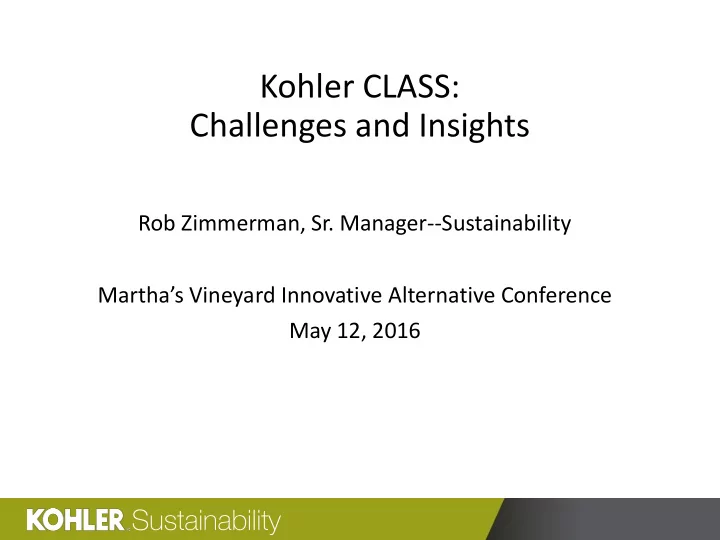

Kohler CLASS: Challenges and Insights Rob Zimmerman, Sr. Manager--Sustainability Martha’s Vineyard Innovative Alternative Conference May 12, 2016
Our Goal: Project Background To enable universal access to sustainable sanitation services by supporting the development of radically new sanitation technologies and markets for new sanitation products and services. Hygienic and sustainable for the world’s poorest • populations Operational cost of $0.05 per user, per day • Does not require sewer, water, nor electricity • No discharge of pollutants •
Caltech Team Approach – Electrolysis of Wastewater Main reactions: at the anode: chlorine generation 2Cl- ----> Cl2 + 2e- at the cathode: hydrogen evolution and hydroxide formation 2H2O + 2e- ----> H2 + 2OH- chemical reaction: chlorine and hydroxide ions react in the electrolyzer to form hypochlorite Cl2 + 2OH- ----> Cl- + ClO- + H2O overall mass balance: production of hypochlorite NaCl + H2O = NaClO + H2
Collaboration Caltech conducts basic and applied research • Kohler designs and manufactures test systems • RTI conducts field testing of system performance •
The Beta Prototype
The Beta Prototype
Fabrication First unit ready for field test site installation in India in September 2015.
Fabrication
Fabrication Electrode set Mechanical cabinet
Field Testing • Worked with the Gates Foundation and the Indian government to identify acceptable test sites. • Several test units are currently operating in Coimbatore. • Purpose of testing is to identify technical issues and user acceptance. Apartment test site, Coimbatore, India
Performance • Good water quality • Clear • Colorless • Disinfected • Steep learning curve associated with the project and technology. • Water quality greatly impacts system performance • Mechanical, electrical issues
Some Learnings • Rapid dissolution of dissolved minerals • Reduction of space between electrodes, and short circuits • Accumulation of gelatinous precipitate on electrodes
Summary • Operating costs higher than expected, but could be offset with solar panels. • Electrode technology is young and manufacturing costs are expected to come down over time. • User acceptance of water for flushing toilets has been good. • Testing will continue for several more months; and learning will continue.
Septic Pre-Treatment Challenges • Source separation—requires change in user behavior and dedicated plumbing and fixtures • Nitrogen removal—electrode design not optimized for this application • Incoming water chemistry • Effects on receiving systems Steward, K-4917 • Performance verification and monitoring • Field testing—volunteers, experimental design
Thank You! Robert.zimmerman@Kohler.com
Recommend
More recommend